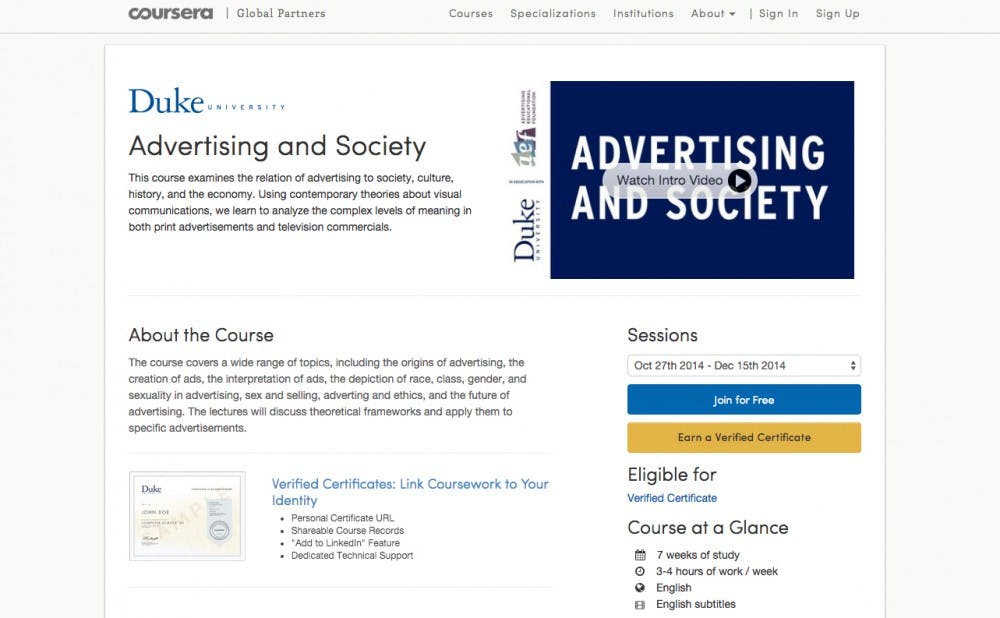Students around the world will soon have online access to one of Duke's most popular courses.
The online version of the course "Advertising and Society"—will become available on Coursera beginning Oct. 27. William O’Barr—a professor of cultural anthropology, English and sociology who has been teaching the course since the 1970s—has historically experienced immense student interest in the subject. The course is the latest step in Duke's relationship with Coursera, which has been strong since the platform's early days.
O’Barr said his motivation for making the class available online is to help a larger audience think more carefully about the role of advertising in their personal lives.
“I jumped at the opportunity to share the class through Coursera because it opens it up to a broader set of students around the world—a much larger set of people with the same goals in mind,” O'Barr said.
The lecture has always been full, even when taught in the Bryan Center's 400-seat Griffith Film Theater, and high interest has also been shown online. Approximately 7,000 people from 147 countries have already signed up for the online course. Of the thousands already signed up, 45 percent of registrants are employed full-time and roughly 60 percent are not students at all. O’Barr, however, said he hopes Duke alumni will learn about the course, so that students he turned away in the past have an opportunity to take it.
“We want to encourage faculty to think about how they are teaching their classes and how they can connect them with a larger Duke audience,” said Randy Riddle, senior academic technology consultant for the Duke Center for Instructional Technology.
Duke was one of Coursera's earliest partners, offering its first courses in Fall 2012 and boasting the course with the highest enrollment in Spring 2013. The University currently has 12 classes on the platform, with more slated to be taught in the Spring.
Despite Duke professors' success with MOOCs, the idea of online courses for credit is still a point of debate. The topic came into the spotlight in Spring 2013, when the Arts and Sciences Council voted down a proposal to join Internet education consortium Semester Online, and has been the subject of ongoing discussion as the Trinity College of Arts and Sciences begins to revamp its curriculum.
O'Barr noted that transitioning a class online has both benefits and drawbacks. The move to an online version presents many opportunities, such as the ability for people in different time zones to watch the lectures at their convenience. However, this creates limited opportunity for real-time discussion and participation. The online lectures are also succinct, rather than discursive and elaborate.
“[The videos] are much more like a TED Talk than a Duke lecture,” O'Barr said.
In order to navigate the obstacles that come with an online course, O’Barr is considering hosting a number of Google Hangouts to answer questions that students have, Riddle said.
Additionally, transforming the course into an online format poses many technical challenges. O’Barr jokingly described the process as “murder," saying he had to integrate different kinds of images and footage in addition to recording and editing his segments.
Making a course electronically available also takes several months of planning.
“It is much more like preparing a TV documentary than a conventional course because there is so much that needs to be done," O'Barr said. "You have to anticipate a lot of things."
Although the course will be available online, O'Barr will continue to teach the course on campus as a live lecture. Duke students cannot currently obtain University credit for taking the course online.
Non-Duke students can sign up for free through Coursera, and the course will follow O'Barr's online textbook called “ADText."
"I want [students] to say, ‘I will never be able to think of advertising again without thinking about this class,'" O'Barr said.
Get The Chronicle straight to your inbox
Signup for our weekly newsletter. Cancel at any time.

